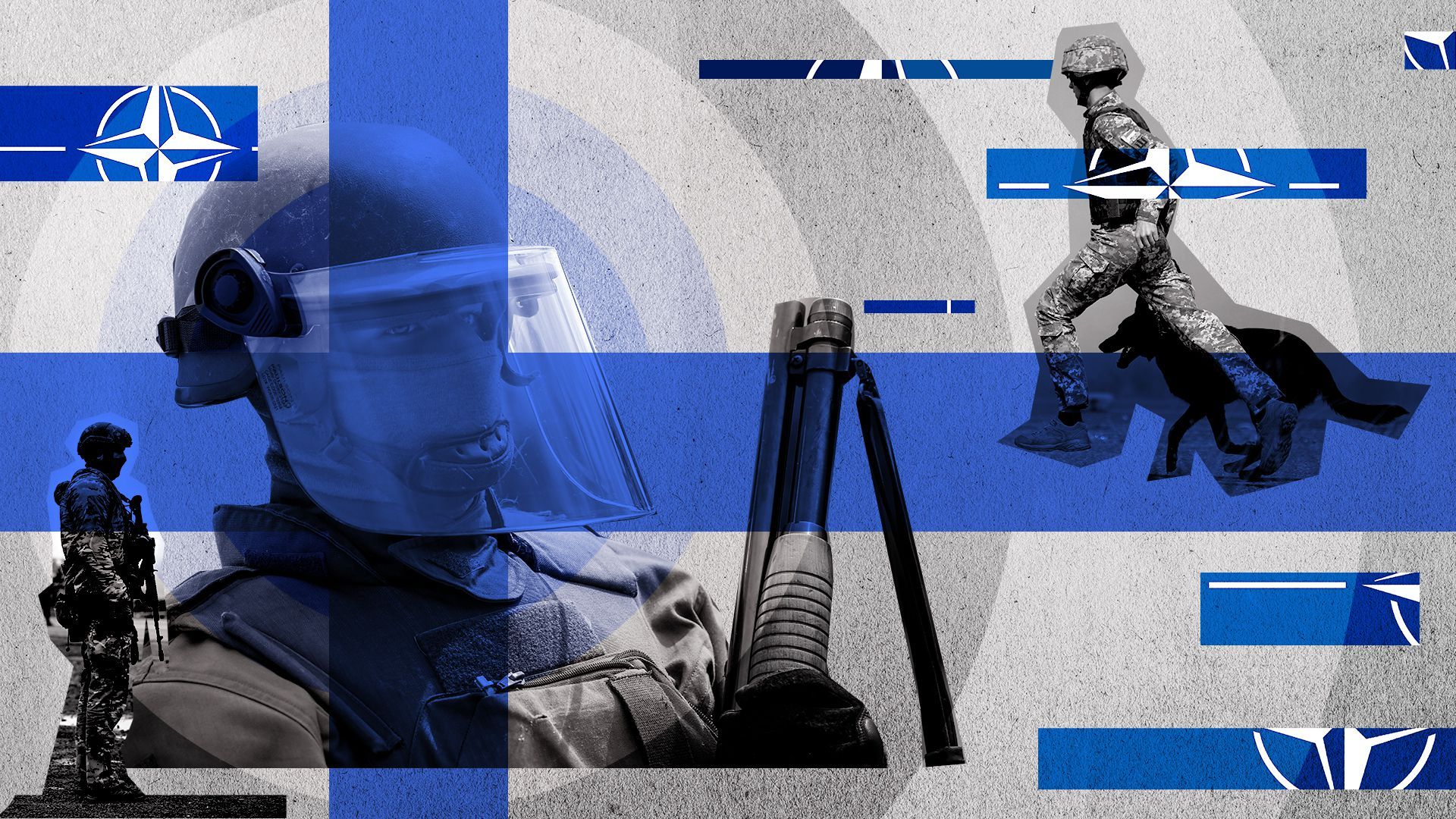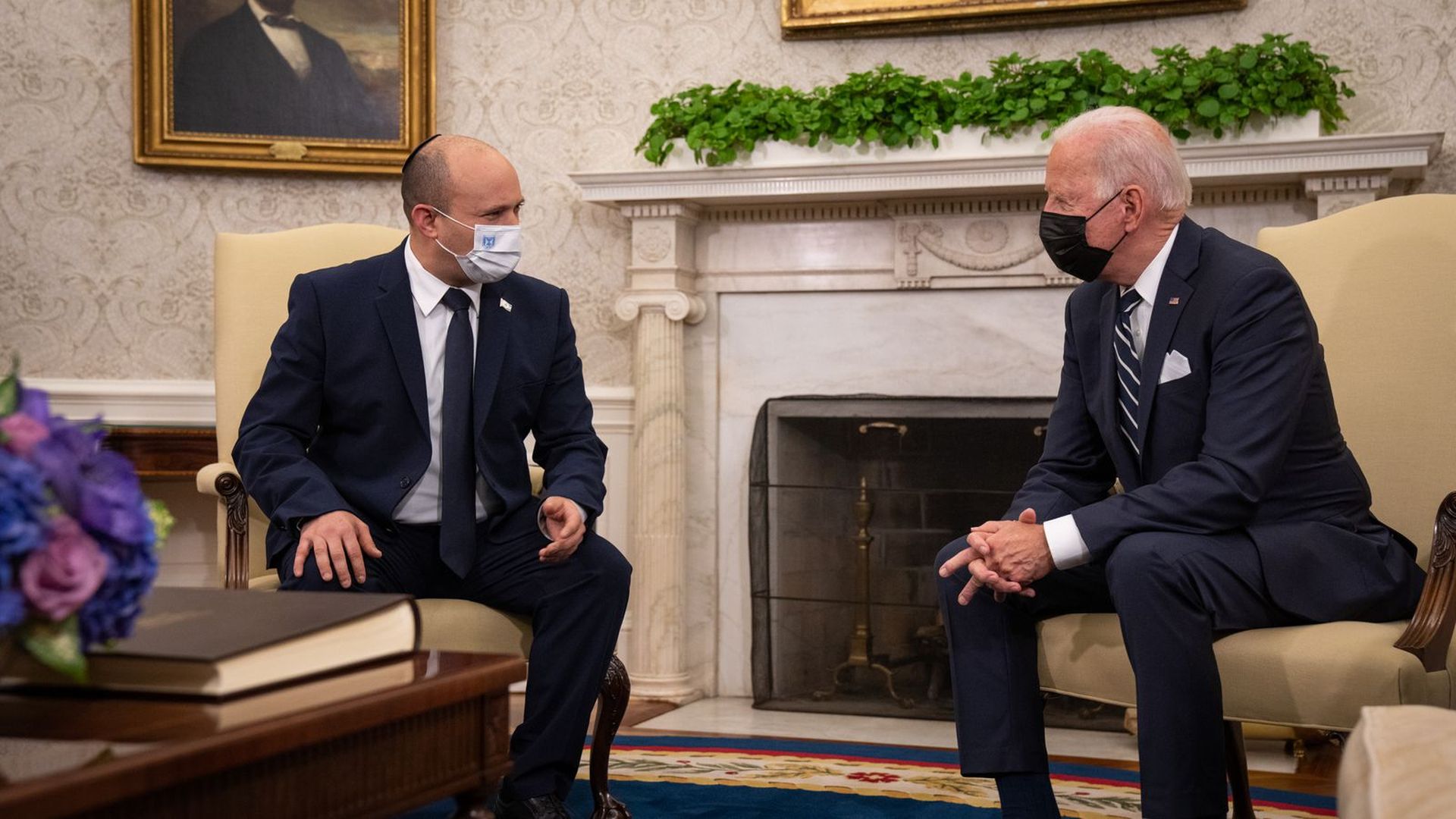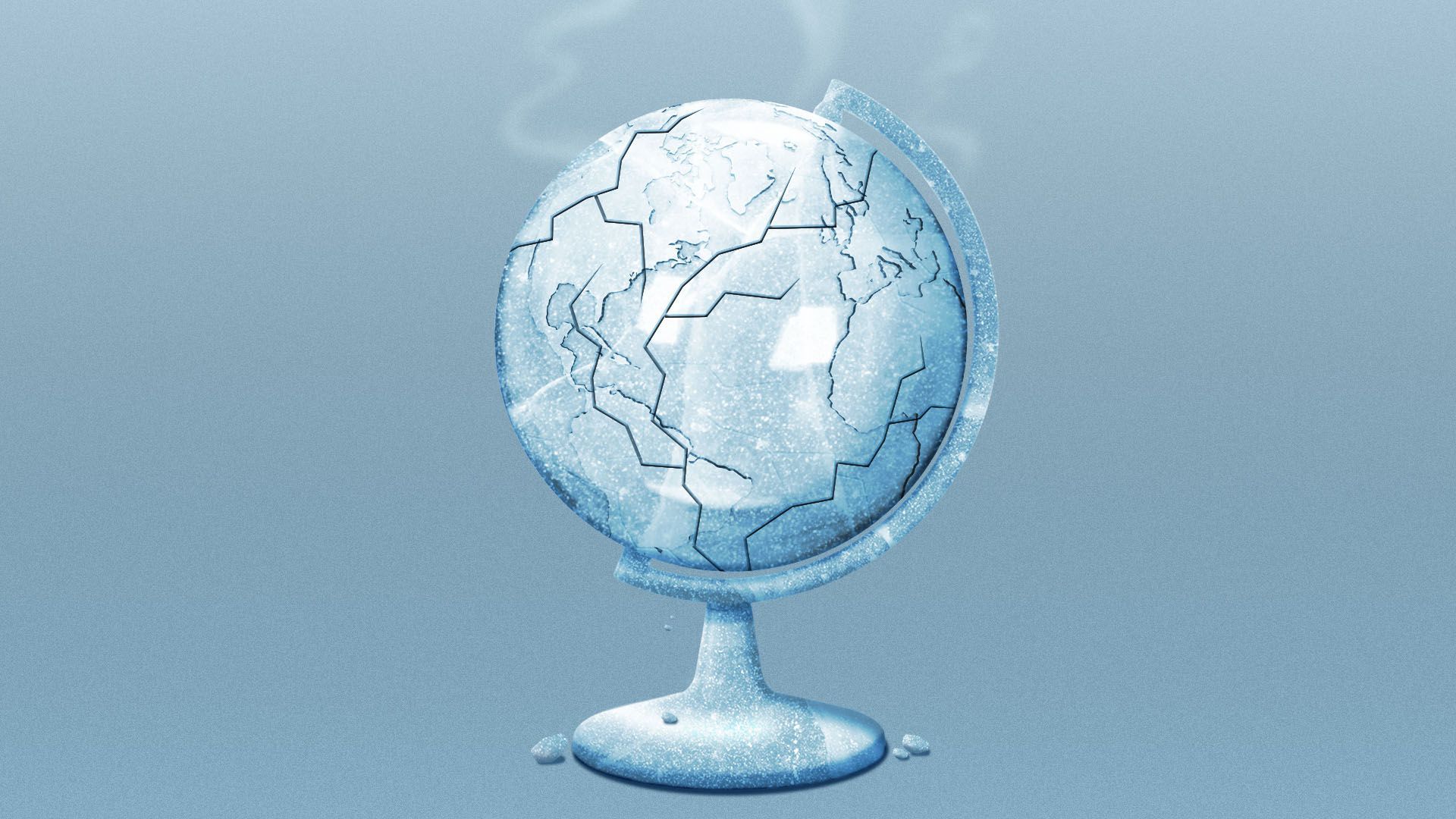| | | | | | | Presented By Babbel | | | | Axios World | | By Dave Lawler · Apr 07, 2022 | | Welcome back to Axios World. - Tonight's edition (1,950 words, 7 minutes) starts in Finland, with stops in Shanghai, Paris, Islamabad and the Arctic.
- My brilliant Axios colleagues carried most of the load while I worked on episode 4 of our podcast on Putin's invasion, coming Monday morning. Listen and subscribe.
| | | | | | 1 big thing: Finland could be NATO's next member — and soon |  | | | Photo illustration: Shoshana Gordon/Axios. Photos: Armend Nimani/AFP via Getty Images | | | | Public support and political momentum for Finland joining NATO has reached an all-time high as a result of the war in Ukraine, raising the very real possibility that the alliance's borders with Russia could extend by more than 830 miles in a matter of months, Axios' Zach Basu reports. Why it matters: Russia's invasion of Ukraine has forced a reckoning in European capitals over defense spending and security policy. If Finland joins NATO, it would represent the biggest transformation of Europe's security architecture in years. State of play: The Finnish government is expected to submit a report to parliament on the changed security environment by the end of this month, kicking off a debate and eventually a recommendation on applying for NATO membership. - 60% of Finns now support joining NATO, according to a survey conducted last month — a 34-point jump from last fall, and the highest level since polling on the issue began in 1998.
- NATO Secretary-General Jens Stoltenberg said this week he expects all "30 allies will welcome" both Sweden and Finland to the alliance if the Nordic neighbors decide to apply, suggesting the process for membership would move rapidly.
What they're saying: "I think Finns at the moment are driven by what I call rational fear," former Finnish Prime Minister Alexander Stubb told Axios in an interview. - "There has been this bona fide attempt to forge a functioning relationship with Russia, and now that people see that that is impossible — especially under [President Vladimir] Putin — they've changed their opinion."
Driving the news: Stubb told Axios he believes the government could decide to apply to NATO as soon as May — a stunning timeline given where public opinion was only a few months ago. - "I'm not saying it'll happen on Russian Victory Day [May 9], but it's coming pretty soon," Stubb quipped.
- Some Finnish lawmakers are pushing for an application before the NATO summit in Madrid at the end of June.
The big picture: Finland maintains a formidable military with 280,000 troops and 900,000 reservists, and it's been deepening its cooperation with NATO for years. - Incorporating Finland into NATO would bring important capabilities and "strategic depth" to the "particularly exposed" Baltic region, says Ian Lesser, executive director of the German Marshall Fund's Brussels office.
- "Finland is a tough nut to crack. ... And Russians of course remember that," Lesser added, referring to the 1939–1940 Winter War in which invading Soviet troops suffered heavy casualties.
Between the lines: Russia's invasion of Ukraine has underscored for non-aligned countries like Sweden and Finland that having close ties to NATO is a long way from having Article 5 protection, as Kyiv's pleas for a no-fly zone have gone unanswered. - "I think the sentiment for most Finns is that we never want to be left alone again, as we were during World War II," added Stubb.
What to watch: Applying to NATO raises the risk that Russia could take aggressive action against Finland in the period after the decision is made and before membership is actually granted. - Stubb dismissed the Kremlin's threats as mostly saber-rattling, but he cautioned that there will "obviously" be hybrid threats, such as cyberattacks or information warfare.
- Still, he insisted: "We've lived next to Russia throughout our existence. We know how to deal with Russia."
|     | | | | | | 2. UN suspends Russia from Human Rights Council |  Data: UN; Map: Jared Whalen/Axios 1. 93 countries voted today to suspend Russia from the United Nations Human Rights Council over reported atrocities in Ukraine, Axios' Laurin-Whitney Gottbrath writes. - China voted with Russia, big countries including India, Mexico and Brazil abstained, but the required two-thirds majority voted to expel Russia.
- Russia is the first permanent member of the UN Security Council to have its membership revoked from any UN body. The only other sitting member of the Human Rights Council to have its membership suspended was Libya in 2011.
- See the interactive map.
2. The U.S., its G7 allies and the European Union banned new investment in Russia over the massacre in Bucha, Ukraine. - The U.S. is also sanctioning Russia's largest bank, as well as Russian elites, including Vladimir Putin's adult daughters.
- Yes, but: It's not clear that sanctions will turn Russians against the war and their president. Opinion polls that are available so far suggest the opposite might actually be happening.
3. The U.S. has shipped over 50 million bullets — not just bigger Stinger and Javelin missiles — as it rushes lethal aid to Ukraine, Axios' Glen Johnson reports. Full list. 4. Dmitry Muratov, Nobel peace laureate and Russian editor of Novaya Gazeta, was splattered in what he believed was red paint mixed with acetone while traveling by train today. His assailant shouted that the attack was "for our boys." - His newspaper, which had published critical coverage of the war, was forced to suspend operations last month.
5. The U.S. and Europe have together ordered the expulsion of more than 400 Russian diplomats and embassy staff since the invasion of Ukraine began on Feb. 24, according to Zach's tally. - Most of them are alleged intelligence officers working under diplomatic cover.
- See the interactive map.
 Data: Axios research; Map: Kavya Beheraj/Axios |     | | | | | | 3. Anger and hunger in locked-down Shanghai |  | | | Mass testing in Shanghai. Photo: Hector Retamal/AFP via Getty | | | | People in Shanghai are facing food shortages, disruptions in medical care and censorship as the city is in lockdown amid China's biggest wave of infections since early 2020, Axios' Bethany Allen-Ebrahimian writes. Why it matters: China's "zero-COVID" policy has saved countless lives, but the extreme measures required to fully contain the highly transmissible Omicron variant are causing other kinds of suffering. State of play: Authorities extended the lockdown after Shanghai reported 13,000 new COVID cases on Monday, a dramatic surge given the national case count hovered in the dozens for most of 2021. - Thousands of Chinese military personnel have been called in to help test all of the city's 26 million residents.
- The lockdown began on March 28, but some neighborhoods have been locked down much longer.
What's happening: Food shortages resulting from panic buying, a lack of workers and movement restrictions are frustrating many of Shanghai's residents. - Treatment disruptions due to medical staff and device shortages reportedly left some dialysis and chemotherapy patients without care for days.
- Some social media users were outraged by news that COVID-positive toddlers were being separated from their parents, but such posts and local coverage of protests against the restrictions and shortages have been censored.
- Numerous factories, including Tesla's, are still closed.
Zoom out: Shanghai isn't alone. The southern city of Shenzhen was briefly shuttered, and the entire province of Jilin in China's northeast remains in lockdown. The big picture: China's zero-COVID policy worked well earlier in the pandemic, when there were less-transmissible variants and protecting an unvaccinated population was far more imperative. - But policymakers in Beijing will have to consider whether zero-COVID is sustainable longer term.
|     | | | | | | A message from Babbel | | Learn a new language fast | | |  | | | | Babbel's language lessons are scientifically proven to be effective. With Babbel, you can start speaking a new language in just three weeks. Here's how: Babbel's quick, 10-minute lessons teach language you can use in the real world. Get started now for up to 60% off your subscription. | | | | | | Bonus: Where in the world? | | Tonight's game is simple: I give you the most populous province (or equivalent), you give me the country. They get a bit trickier as you go. - California
- Uttar Pradesh
- North Rhine-Westphalia
- Ontario
- Punjab
- Dubai
- New South Wales
- Flanders
- Oromia
- Zulia
- Bagmati
- Selangor
- Jonglei
- Chuuk
|     | | | | | | 4. Leaders in limbo |  | | | Emmanuel Macron. Photo Illustration: Eniola Odetunde/Axios. Getty Images photos: Thierry Monasse/Contributor | | | | 1. President Emmanuel Macron is still the favorite to finish first in Sunday's first-round presidential election, but his likely run-off opponent — far-right candidate Marine Le Pen — is surging in head-to-head polls. - Macron beat Le Pen 66% to 34% five years ago. But his lead in Politico's Poll of Polls is down to 6% and all of the momentum is in Le Pen's favor. The markets are getting jittery.
- How it happened: Le Pen was campaigning across the country and driving home her message about the high cost of living while Macron was in Paris focusing on Ukraine, Politico's Giorgio Leali reports.
2. Pakistan Prime Minister Imran Khan is likely on his way out after the Supreme Court ruled today that his move to dissolve parliament and call for early elections was unconstitutional. - What's next: Khan now faces the no-confidence vote he'd sought to avoid on Saturday. If he loses, the opposition can appoint a new prime minister to take power until elections in August 2023.
3. Yemen President Abed Rabbo Mansour Hadi handed power to an eight-member governing council just days after a two-month nationwide truce was declared. - The backstory: The Saudi-backed president fled the capital in 2015 after the Houthi rebels took it, sparking seven years of war. It's unclear whether today's dramatic step will ease the path to peace.
4. Ex-Burkina Faso President Blaise Compaoré was convicted today of helping to murder his predecessor, Thomas Sankara, in 1987. - The scene: "After six months of hearings, a heavily protected courtroom in the capital, Ouagadougou, erupted in applause after judges convicted Mr. Compaoré in absentia and declared a sentence of life imprisonment," the NYT's Declan Walsh reports.
|     | | | | | | 5. U.S. floats White House meeting between Israelis and Palestinians |  | | | President Biden meets Israeli Prime Minister Naftali Bennett last August. Photo: Sarahbeth Maney/The New York Times/Bloomberg via Getty | | | | The Biden administration has been floating the idea of a White House meeting between senior Israeli and Palestinian officials, Axios' Barak Ravid scoops. Behind the scenes: U.S. officials have raised that possibility with Israeli officials several times over the last four months — and also discussed it with the Palestinians, Egyptians and Jordanians. While the Israeli side didn't reject it outright, they presented several reservations. - The White House suggested holding the meeting at the level of national security advisers rather than heads of state and focusing it on security and economic cooperation between Israel and the Palestinian Authority, three current and former U.S. officials and two Israeli officials told Axios.
- But the chances of such a meeting fell significantly on Wednesday after Prime Minister Naftali Bennett's government lost its parliamentary majority.
The big picture: Israel's broad unity government — which includes left-wing and right-wing members — has decided not to engage in any peace initiatives with the Palestinians because of internal divisions on that issue. - At the same time, Bennett's government has abandoned the Benjamin Netanyahu-era policy of rejecting all dialogue, and it's taken confidence-building steps like issuing 20,000 permits for Gazans to work in Israel.
- The potential meeting would be a way for the White House to show international and regional backing for such measures and signal that there is a political horizon for the Palestinian people.
|     | | | | | | 6. One to watch: Polar science cracking under geopolitical strain |  | | | Illustration: Sarah Grillo/Axios | | | | Crucial scientific projects in the Arctic are in limbo as Russia becomes more isolated from the world for its invasion of Ukraine, Axios' Alison Snyder and Andrew Freedman write. Why it matters: These research collaborations provide key insights about the effects of climate change, the health of the oceans and geology — and they underpin cooperation between the U.S., Russia and others in the geopolitical hotspots of the Arctic and Antarctica. Driving the news: Scientific projects and collaborations are on hold around the world as sanctions and the severing of ties with Russian research institutions prevent scientists in the U.S., Europe and elsewhere from working with their colleagues and students in Russia. - The war's effects are being felt acutely by scientists who work in the Arctic, where the summer research season is about to get underway.
- Last month, seven of the eight members of the Arctic Council paused all activities with Russia, the council's eighth member and current chair.
- About 53% of the Arctic Ocean coastline belongs to Russia. Access alone to that land and sea makes the country a key partner for international research on biology, ecology and conservation.
Go deeper. |     | | | | | | 7. Stories we're watching |  | | | Spring stroll in Seoul. Photo: Anthony Wallace/AFP via Getty | | | - Turkey moves Khashoggi murder trial to Saudi Arabia
- First Darfur war crimes trial at ICC gets underway
- Israeli government on brink of collapse
- Major UN climate change report: key takeaways
- Yemen truce met with hope and caution
- AUKUS to cooperate on hypersonic weapons
- Interview: Estonia PM warns against "peace at any price" with Putin
Quoted: "We have significant losses of troops and it's a huge tragedy for us." — Kremlin spokesperson Dmitry Peskov today with a notable admission |     | | | | | | A message from Babbel | | Learn more than just language | | |  | | | | Speak a new language in just three weeks with Babbel's language lessons. Even better: Babbel provides context to the words you're studying by integrating cultural knowledge. Tips are sprinkled throughout lessons for easy learning. Try it today and get up to 60% off your subscription. | | | | Answers: 1. U.S.; 2. India; 3. Germany; 4. Canada; 5. Pakistan; 6. UAE; 7. Australia; 8. Belgium; 9. Ethiopia; 10. Venezuela; 11. Nepal; 12. Malaysia; 13. South Sudan; 14. Micronesia |  | It's called Smart Brevity®. Over 200 orgs use it — in a tool called Axios HQ — to drive productivity with clearer workplace communications. | | | | | | Axios thanks our partners for supporting our newsletters. If you're interested in advertising, learn more here.
Sponsorship has no influence on editorial content. Axios, 3100 Clarendon Blvd, Suite 1300, Arlington VA 22201 | | | You received this email because you signed up for newsletters from Axios.
Change your preferences or unsubscribe here. | | | Was this email forwarded to you?
Sign up now to get Axios in your inbox. | | | | Follow Axios on social media:    | | | | | |













No comments:
Post a Comment